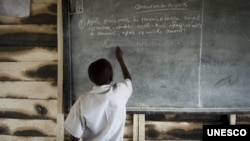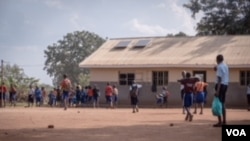Millions of African children are without education, as schools struggle to cope with the impact of armed conflict and insecurity.
The Norwegian Refugee Council says that as of June 2024, more than 14,300 schools were closed in 24 African countries. Countries with the most closures were Burkina Faso, the Democratic Republic of Congo, Cameroon, Chad, Nigeria and Niger.
Christelle Hure of the NRC’s Western Central Africa office said the schools that have closed because of violence impact an estimated 2.8 million children.
“It means that these children are deprived of education but also more vulnerable to different protection risks,” she said.
Aid agencies say the lack of instruction makes it easy for the armed groups to recruit children, disrupting their education and further decreasing their chances of ever attending classes.
The lack of schooling also makes children vulnerable to violence and exploitation, perpetuating cycles of poverty and instability.
The latest figure is an increase of 1,100 closures from the previous year, when 13,200 schools were closed due to conflict and insecurity.
In some countries, conflict has nearly overwhelmed the education system. The U.N. children's agency, UNICEF, says one in four schools in Burkina Faso is closed.
In the Democratic Republic of Congo, at least 1,450 schools nationwide were closed as of January, affecting 500,000 students.
Risasi Mwinyi Patience, 47, a Congolese refugee living in Uganda, and two children were among those affected by school closures in the DR Congo. Fighting in Congo’s Ituri province claimed the life of his wife. He fled to Uganda in April, seeking safety.
He said the Congolese school where his children, in fourth and sixth grades, were enrolled has closed. He has enrolled them in school in Uganda.
Hure of the NRC said the circumstances that cause school closures vary from country to country, with three main reasons.
“The first reason is really for military purposes. It's about regaining or gaining control over territory,” she said. “The second reason is schools are seen by non-state town groups as a symbol of the government's authority,and then the last reason is that in some cases, schools are seen as promoting ideologies that these groups are opposed to, such as education for girls or teaching French."
Patience said he is concerned about his future and that of his children, who are forced to start education again due to the language barrier. Schools in the DR Congo are taught in French but now their school is taught in English.
He said his children have been told to repeat classes and start from the beginning, adding further difficulty to their life in the refugee camp.
Though the general situation remains dire, some schools have reopened in the Central African Republic and Mali due to improved security, and in Burkina Faso, some 1,300 schools have reopened since October 2023, after government forces took control of some areas from terror groups.
The Oslo-based agency calls on the international community, governments and warring parties to protect education by ending attacks on schools and ensuring the safety of learners and teachers.

